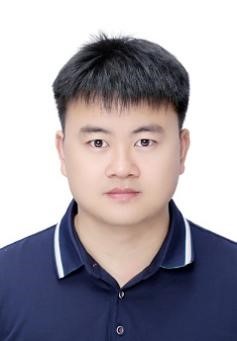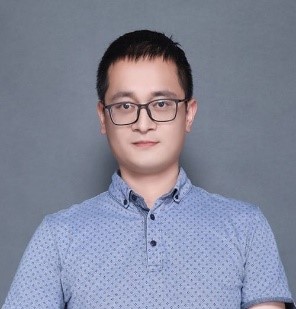
Systems Research Institute of Polish Academy of Science, Warsaw, PolandMachine learning; AI and signal processing for biomedical applications; Brain computer interface
Polish computer scientist, electrical engineer, and a professor at the Systems Research Institute of Polish Academy of Science, Warsaw, and Nicolaus Copernicus University (UMK) in Toruń, Poland

Nanjing University of Information Science and Technology, Nanjing, ChinaMixed reality; Robotics; AI; Power electronics; Power engineering
Full Professor at Nanjing University of Information Science and Technology
Director of the Imagineering Institute, Malaysia
Visiting Professor at Raffles University, Malaysia
Visiting Professor at University of Novi Sad-Serbia
Key laboratory of Chinese internal medicine of Ministry of Education, Dongzhimen Hospital affiliated to Beijing University of Chinese Medicine, Beijing, ChinaEvidence based TCM; Clinical research of TCM; TCM on cardiovascular diseases; Effect characteristics of TCM; Mechanisms of TCM

School of Artificial Intelligence and Computer Science, Nantong University, Nantong, ChinaDeep neural networks; Multimodal machine learning; Medical images analysis
Dean of the School of Artificial Intelligence and Computer Science, Nantong University
Visiting Professor, Xi’an Jiaotong-Liverpool University
PhD Supervisor, City University of Macau
Ranked among the Top 2% of Scientists Worldwide by Stanford University for five consecutive years (2020–2024), including the "Career-Long Impact" List in 2024
Named to the Global Top 0.05% of Scientists (Rank #1021) by ScholarGPS in 2024
Served as Editorial Board Member, Associate Editor, or Field Editor for 13 internationally renowned academic journals

School of Physics, Maths and Computing, Computer Science and Software Engineering, The University of Western Australia, Perth, AustraliaComputational intelligence; Humanized computational intelligence based technology; Bio-signal/Image pattern recognition; Machine learning

School of Medicine, Tokai University, Isehara, JapanHematopathology; Histopathology; Immune microenvironment; Immuno-oncology; Molecular pathology
Joaquim Carreras, MD, PhD. is a pathologist with a medical degree from the University of Barcelona, Spain. His medical specialty was pathology (specialty residency) at the Department of Pathology, Hospital Clinic of Barcelona, Spain. His Ph.D. focused on hematopathology and was obtained from the Department of Pathology, Faculty of Medicine, University of Barcelona. He has worked as a pathologist in Spain, as a clinical research associate at the University of Cambridge (United Kingdom), Biomedical Research Institute of the National Institute of Advanced Industrial Science and Technology (AIST) as a Japan Society for the Promotion of Science (JSPS) post-doctoral fellow, and he is currently at Tokai University School of Medicine.

Division of Graduate Studies and Research, Tijuana Institute of Technology, Tijuana, MexicoType-2 fuzzy logic in medical diagnosis; Type-3 fuzzy logic in medical diagnosis; Fractal dimension in classification; Hybrid intelligent systems
Oscar Castillo holds the Doctor in Science degree (Doctor Habilitatus) in Computer Science from the Polish Academy of Sciences (with the Dissertation “Soft Computing and Fractal Theory for Intelligent Manufacturing”). He is a Professor of Computer Science in the Graduate Division, Tijuana Institute of Technology, Tijuana, Mexico. Additionally, he serves as Research Director of Computer Science and heads the research group on Hybrid Fuzzy Intelligent Systems. Currently, he is President of HAFSA (Hispanic American Fuzzy Systems Association) and Past President of IFSA (International Fuzzy Systems Association). Prof. Castillo is also Chair of the Mexican Chapter of the Computational Intelligence Society (IEEE). He also belongs to the Technical Committee on Fuzzy Systems of IEEE and to the Task Force on “Extensions to Type-1 Fuzzy Systems”. He is also a member of NAFIPS, IFSA, and IEEE. He belongs to the Mexican Research System (SNI Level 3). His research interests are in Type-2 Fuzzy Logic, Fuzzy Control, Neuro-Fuzzy, and Genetic-Fuzzy hybrid approaches. He has published over 400 journal papers, 20 authored books, 100 edited books, 300 papers in conference proceedings, and more than 400 chapters in edited books, in total 1236 publications according to Scopus (H index=87), and more than 1400 publications according to Research Gate (H index=100 in Google Scholar). He has been a Guest Editor of several successful Special Issues in the past, including those in the following journals: Applied Soft Computing, Intelligent Systems, Information Sciences, Nonlinear Studies, Fuzzy Sets and Systems, JAMRIS, and Engineering Letters. He is currently Associate Editor of the Information Sciences Journal, Applied Soft Computing Journal, Engineering Applications of Artificial Intelligence, Granular Computing Journal and the International Journal on Fuzzy Systems. Finally, he was elected IFSA Fellow in 2015 and MICAI Fellow member in 2017. He has been recognized as Highly Cited Researcher in 2017 and 2018 by Clarivate Analytics because of having multiple highly cited papers in Web of Science.

School of Mechanical Engineering, Shanghai Jiao Tong University, Shanghai, ChinaComputer aided surgery; Biomedical image analysis; VR/AR/MR technology in medicine; Surgical robotics
Prof. Xiaojun Chen is with Institute of Biomedical Manufacturing, School of Mechanical Engineering, Shanghai Jiao Tong University (SJTU), China. He received his Ph.D from SJTU in 2006, and then furthered his research as a postdoctoral fellow at the same institution until 2008. After that, he has been working at SJTU as assistant professor (2008-2010), associate professor (2010-2018), full professor(2018-2025), and tenured full professor(2025-now). His research focuses on biomedical image analysis, image-guided interventions, artificial intelligence in biomedical physics and analysis, VR/AR/MR technology in medicine, medical robotics, biomedical manufacturing, etc. As a visiting professor, he had worked at the Surgical Planning Laboratory, Harvard Medical School during Oct 2011~ Oct 2012; the TIMC-IMAG lab, CNRS, France during Sep~Dec 2013; the OMFS-IMPATH lab, KU Leuven, Belgium during Jun~Aug 2015, and the CISTIB lab, the University of Sheffield, UK during Jun~ Aug 2016.
He is the author and co-author of more than 200 peer-reviewed journal/conference articles in MedIA, IEEE-TMI, IEEE-TBME, IEEE-TVCG, CMIG, CMPB, IJCARS, etc., the owner of more than 30 patents, and have delivered more than 50 lectures in the prestigious international conferences including IEEE-EMBC, IEEE-ITAB, MICCAI, CARS, iSMIT, CAI, etc. He was granted Second Prize of National Science & Technology Progress Award of China (2019), Chinese Society of Stomatology Science and Technology Award (2018), Jiangsu Province Science & Technology Award (2017), China Medical Science and Technology Award (2016), Shanghai Science & Technology Award (2010), Shanghai Medical Science & Technology Award (2008).

Department of Computer Science, Virginia Commonwealth University, Richmond, USAMachine learning; Data mining; Computational intelligence; Biomedical informatics
Google Scholar Link:
https://scholar.google.com/citations?user=hrWVmoAAAAAJ&hl=en

Big Data Engineering and Analytics Laboratory (iDEA Lab), University of Calabria, Rende, ItalyBig data; Database systems; OLAP; Data warehousing; Knowledge discovery
Alfredo Cuzzocrea is an associate professor in computer engineering with the University of Calabria, Rende, Italy. He is the Head of the Big Data Engineering and Analytics Lab of the University of Calabria. His current research interests include span the following scientific fields: big data, database systems, data mining, data warehousing, and knowledge discovery. He is author or co-author of more than 520 papers in international conferences, international journals and international books. He is recognized in prestigious international research rankings, such as: (i) Top Scientists in Computer Science and Electronics by Guide2Research, Clifton, NJ, USA; (ii) Top Italian Scientists in Computer Sciences by Virtual Italian Academy, Manchester, UK; (iii) Top Researchers in Computer Science 2013–2018 by SciVal Elsevier, Amsterdam, Netherlands.

Thrust of Artificial Intelligence, Hong Kong University of Science and Technology (Guangzhou), Guangzhou, ChinaMulti-modal learning; AI for in-vitro fertilization; Multi-modal large language model for healthcare

Department of Surgery, Otto von Guericke University Magdeburg, Magdeburg, GermanyRobotic surgery; Visceral surgery; Hepatic-pancreatic and biliary surgery; Laparoscopic surgery; Minimally invasive surgery

Baltic Center for Artificial Intelligence and Neurotechnology, Immanuel Kant Baltic Federal University, Kaliningrad, RussiaMachine learning; Neuroscience

Department of Pathology and Laboratory Medicine, University of Saskatchewan, Saskatoon, CanadaArtificial intelligence; Machine learning; Pattern recognition; Ethical and regulatory issues; Medicine and health care; Pathology and laboratory medicine; health sciences education, teaching and learning; Algorithms in clinical pathology and healthcare

Department of Electrical and Computer Engineering, Morgan State University, Baltimore, USAMachine learning; Deep learning; Artificial intelligence for medical application; Biomedical image analysis; Signal/image processing; stochastic processes; Pattern recognition; Image segmentation; Image/shape registration; Multimedia encryption

Faculty of Engineering, The University of Sydney, Sydney, AustraliaMachine learning; Artificial intelligence and IoT in healthcare; Digital twins; Bioinformatics; Signal processing; Wireless communications

Department of Mathematics and Statistics, University of York, Toronto, CanadaBig data mining in biomedicine; Vaccination; Global health; Biostatistics; Data science
Nicola Luigi Bragazzi got his MD in general medicine and surgery from Genoa University (Genoa, Italy) in 2011, his PhD in biophysics from Marburg University (Marburg, Germany) in 2014 and his specialization in Public Health from Genoa University (Genoa, Italy) in 2017. He is a member of the Cochrane Association (Cochrane Reviewer) for the Cochrane Epilepsy Group. He has been awarded Young Knight of the Italian Republic by the President Carlo Azeglio Ciampi in 2005. Recently, in 2019, he has been nominated as one of the top five biomedical researchers worldwide aged less than 40 years in terms of number of publications, articles in Q1 biomedical journals, total impact factor and h-index. He is currently working on infectious disease and vaccination modelling and big data mining in biomedicine at York University.

School of Computing and Mathematical Science, University of London, London, United KingdomMachine intelligence; Machine learning algorithms and artificial intelligence system architectures; Educational technologies; Neural networks and deep learning; Intelligent systems for psychophysiological data modelling; Classification (neurodegenerative diseases, ASD)

College of Pharmaceutical Sciences, Zhejiang University, Hangzhou, ChinaMolecular dynamics; Molecular docking; Virtual screening; Molecular modeling; Structure-based drug design and discovery; Cancer biology; Glioma; Glioblastoma multiforme (GBM); Molecular biology; Animal studies

Department of Electrical and Computer Engineering, University of Alberta, Edmonton, AB T6R 2V4, CanadaComputational intelligence; Human-centric intelligent systems; Data mining; Pattern recognition; Biometrics
Witold Pedrycz (IEEE Life Fellow) is Professor in the Department of Electrical and Computer Engineering, University of Alberta, Edmonton, Canada. He is also with the Systems Research Institute of the Polish Academy of Sciences, Warsaw, Poland. Dr. Pedrycz is a foreign member of the Polish Academy of Sciences and a Fellow of the Royal Society of Canada. He is a recipient of several awards including Norbert Wiener award from the IEEE Systems, Man, and Cybernetics Society, IEEE Canada Computer Engineering Medal, a Cajastur Prize for Soft Computing from the European Centre for Soft Computing, a Killam Prize, a Fuzzy Pioneer Award from the IEEE Computational Intelligence Society, and 2019 Meritorious Service Award from the IEEE Systems Man and Cybernetics Society.

School of Computer Science, Faculty of Engineering and Information Technology, University of Technology Sydney, Sydney, AustraliaMachine learning; Artificial intelligence; Big data; Brain-computer interfaces; Healthcare; Biomedical science

School of Information Resource Management, Renmin University of China; Beijing, ChinaAI-enabled health informatics; Smart healthcare systems; Multimodal data fusion; Data-driven decision-making; Intelligent information analysis; Digital humanities and knowledge services
Minghui Qian is a Professor at Renmin University of China, where he serves as Director of the Office of Scientific Research and the Journal Management Center. He is also a Wu Yuzhang Distinguished Professor, Secretary-General of the Institute for Digital Humanities, and Deputy Director of the Information Analysis Research Center. His research focuses on data management, information analysis, and brand decision-making. He has led over 40 national and ministerial-level projects, published more than 140 papers and 12 monographs, and received nearly 50 academic and teaching awards, including top honors from the Ministry of Education and the National Intellectual Property Administration.

Department of Electronic Engineering, Chinese University of Hong Kong, Hongkong, ChinaIntelligent surgical robotics, continuum compliant cooperative and cognitive robotics (C4R); Untethered flexible robotics and sensing; Biorobotics & intelligent systems; Medical mechatronics, continuum, and soft flexible robots and sensors

Human Performance Research Laboratory, University of Pernambuco, Petrolina, BrazilHealth sciences; Electronic health; Mobile health; Artificial intelligence (AI) in health; AI-assisted diagnostics; Applied machine learning for healthcare

School of Biomedical Engineering, Science and Health Systems, Drexel University, Philadelphia, USAMovement science; Smart prosthetics; Brain-computer interface (BCI); Transfer of learning & task analyses; Neuroimaging & wearable technologies; Machine learning and data science

Department of Computer Science, Mid Sweden University, Östersund, Ostersund, SwedenAI/ML for edge/cloud computing; Smart and healthcare; IoT; IoMT; Physical layer security in 5G applications; Multimedia transmission in healthcare applications; Body sensor networks; Energy harvesting for healthcare systems

BioMedical Artificial Intelligence Research Unit, Institute of Innovative Research, Tokyo Institute of Technology, Yokohama, JapanMachine/Data Learning in Biomedical Imaging; Computer-aided Detection and Diagnosis of Lesions in Biomedical Images; Biomedical Image Processing and Analysis

Department of Bioengineering and the Department of Electrical and Computer Engineering, Lehigh University, Bethlehem, USAMachine learning/deep learning; Brain imaging analysis and prediction; Computational neuroscience; Medical imaging computing; Precision medicine; Computer-aided diagnosis and prediction

State Key Laboratory of Intelligent Control and Management of Complex Systems, Institute of Automation, Chinese Academy of Sciences, Beijing, ChinaBig data and data mining; Artificial intelligence; Machine learning; Pattern recognition; 3D physical simulation; Embedded video image processing

Faculty of Environment and Life, Beijing University of Technology, Beijing, ChinaBiomedical ultrasonics; Quantitative ultrasound for biological tissue characterization; Ultrasound wave propagation in biological tissues; Medical signal/image processing: Artificial intelligence in medicine

Faculty of Health, University of Plymouth, Plymouth, United KingdomAI in health and care; Explainable machine learning (XAI) in healthcare; Health data science; Health informatics; Ethical AI in healthcare; Electronic health records analytics; Natural language processing /text mining in healthcare

Key Laboratory of Knowledge Engineering with Big Data (the Ministry of Education of China), School of Computer Science and Engineering, HeFei University of Technology, Hefei, ChinaKnowledge-driven Optimization; Knowledge Graph; Multimodal GraphRAG

Biomedical Engineering, Cairo University, Cairo, EgyptBiomedical image processing; Bioinformatics; Artificial intelligence

Center for Spatial Information Science, The University of Tokyo, JapanHuman-centered healthcare; Computational mental health; AI for science; Dynamic graphs and systems; Time series forecasting; Natural language processing; Emotion recognition; Clustering and active learning

College of Medical Instrumentation, Shanghai University of Medicine & Health Sciences, Shanghai, ChinaMedical informatics; Biomedical engineering; Cardiopulmonary medicine

School of Intelligent Medicine, Chengdu University of Traditional Chinese Medicine, Chengdu, ChinaAI in traditional chinese medicine (TCM); Machine learning; Large language model for healthcare

College of Mechanical and Electrical Engineering, Nanjing University of Aeronautics and Astronautics, Nanjing, ChinaIntelligent ophthalmology; Image analysis in ophthalmic imaging; Image segmentation; Computer vision








































































